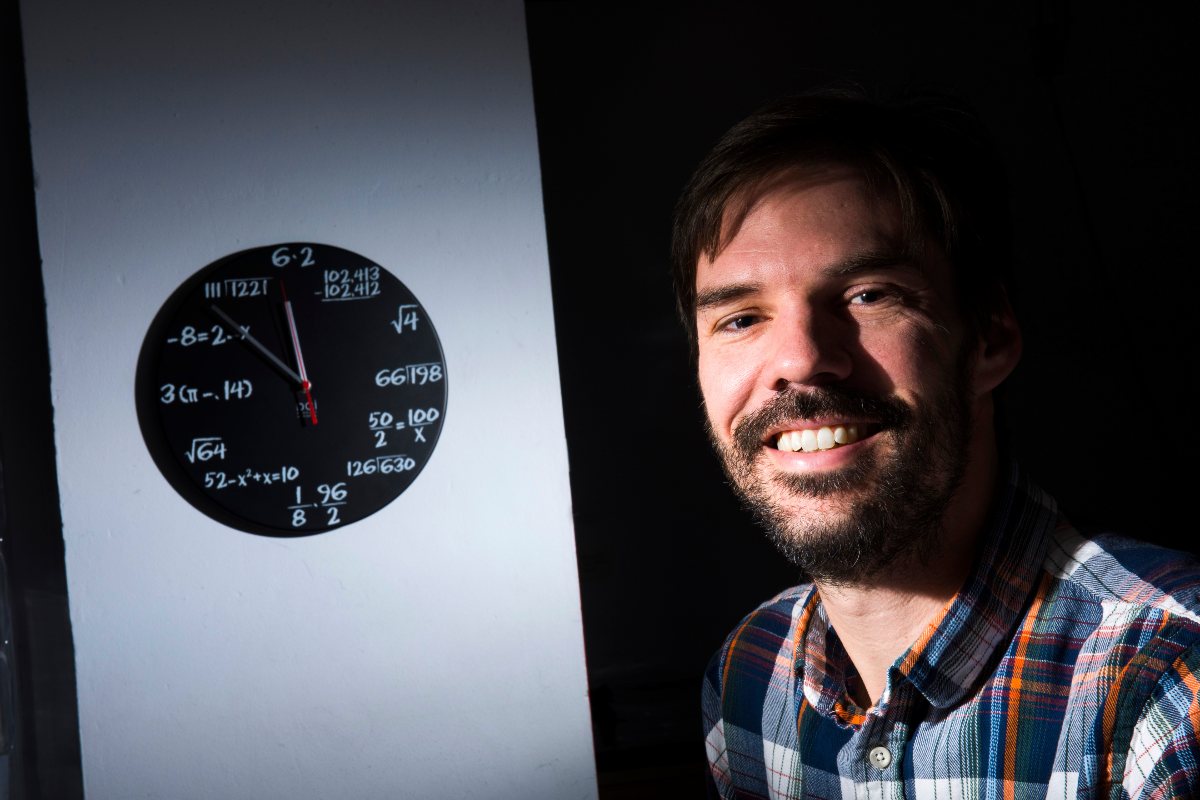
Meet Vincent Bouchard, a professor and associate chair (undergraduate) in the University of Alberta’s Department of Mathematical and Statistical Sciences. Photo credit: John Ulan
Vincent Bouchard is puzzled by the perception that mathematics is difficult, boring, or obscure.
“I truly believe that all of us can do mathematics, just as all of us can tell stories,” said Bouchard, a professor and associate chair (undergraduate) in the University of Alberta’s Department of Mathematical and Statistical Sciences.
“Mathematics is not just about the mathematical language—it is about storytelling, in the abstract language of mathematics. Yes, it does require practice, skill, and experience, just like any other discipline. But once one sees the beauty and freedom of math, it becomes irresistible!”
Bouchard has kept his course material vibrant and engaging throughout the pandemic by recording videos for his students. Hear more from Bouchard.
What do you teach?
I am teaching a variety of courses in mathematics and mathematical physics, from first-year Calculus for the Physical Sciences I and II (MATH 144 and 146), to higher level courses like Group Theory in Physics (MA PH 464). I like variety; it's fun to teach something new, as I learn a lot in the process.
What do you love about your field?
I love math! Math is so often misunderstood. People think of it as a dry, technical subject—but it's so far from that. Math is storytelling. It's storytelling about symmetries, patterns, shapes, numbers. It's storytelling about how various patterns that are common in different contexts can be unified neatly in terms of abstract structures.
And the cool thing about math is that we are free to explore whatever we want, just like an artist is free to paint whatever he likes. Pure math is different from science, inasmuch as we are free to write our own mathematical stories. Georg Cantor, a famous mathematician, once said: "The essence of mathematics lies entirely in its freedom." We are only bound by the limits of our imagination, by our inspiration. We spend our whole life playing around and having fun within the world of ideas. Isn't that great? Perhaps this is what I love the most about math.
What should students who are interested in this topic know?
Many students are scared of math. For some strange reason, in our society math is seen as a difficult, obscure discipline. I truly believe that all of us can do mathematics, just as all of us can tell stories. Mathematics is not just about the mathematical language—it is about storytelling, in the abstract language of mathematics. Yes, it does require practice, skill, and experience, just like any other discipline. But once one sees the beauty and freedom of math, it becomes irresistible.
My advice would be to keep an open mind, and try to see the beauty in math, instead of exclusively focusing on the technical aspects of the language. In other words, let's not focus only on the grammar. Let's look at the story!
Tell me about your passion for teaching. What inspires you?
I really like teaching. In fact, I wouldn't call it teaching: I would call it being a guide. Teaching is not about transmitting knowledge to students. that's not how it works. It's about creating a learning environment in which students are actively involved. Students learn when they do math. My role is to guide them, help them when needed, and most importantly get them involved. It is so inspiring to see students grow, learn, and become independent and critical thinkers.
I also think that one of my main roles as a teacher is to motivate students. We learn if we are active and do math, but to put the effort in, we first need to be motivated. One of my roles is to convey how much fun math is, whether it is first-year calculus or advanced abstract concepts; how fascinating mathematical ideas are, and how beautiful mathematical stories can be. I like to make things fun, to try to make math vibrant, and to laugh at myself in the process!
For instance, as playing music is another passion of mine, I like to mix music and math: I started most of my videos for Calculus for the Physical Sciences I and II by playing a short math song introducing the video. I had so much fun creating those.
Our world has been turned upside down during the COVID-19 pandemic. What advice would you give students on learning in a remote environment?
Even though it's already been one year, we are still all learning how to be effective in a remote environment. Perhaps some of the main challenges for students with remote teaching is the lack of a student community, and how easy it is to lose motivation and do something else when we stay at home. (I experience this myself!)
My advice would be to use all opportunities to communicate with other students, make friends, create learning communities, even if it is remotely. It is much more fun, and much more effective, to do math with other people. We learn by doing math, but also by sharing, communicating, and discussing. All of this is challenging in a remote learning environment, but it is possible.
Curious to learn more? Find more information on teaching and learning in the University of Alberta’s Faculty of Science.